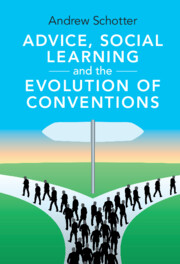Book contents
- Frontmatter
- Dedication
- Brief Contents
- Contents
- Figures
- Tables
- Preface
- 1 Introduction
- Part I Background
- Part II Coordination, Distribution, and Trust Conventions
- Part III The Impact of Public Advice and Common Knowledge
- 7 The Impact of Private and Public Advice in the Minimum-Effort Game
- 8 Advice and Common Knowledge in the Two-Thirds Guessing Game: Does Advice Increase Strategic Sophistication?
- Part IV The Value of Advice
- Part V Advice and Economic Mechanisms
- Index
7 - The Impact of Private and Public Advice in the Minimum-Effort Game
from Part III - The Impact of Public Advice and Common Knowledge
Published online by Cambridge University Press: 09 March 2023
- Frontmatter
- Dedication
- Brief Contents
- Contents
- Figures
- Tables
- Preface
- 1 Introduction
- Part I Background
- Part II Coordination, Distribution, and Trust Conventions
- Part III The Impact of Public Advice and Common Knowledge
- 7 The Impact of Private and Public Advice in the Minimum-Effort Game
- 8 Advice and Common Knowledge in the Two-Thirds Guessing Game: Does Advice Increase Strategic Sophistication?
- Part IV The Value of Advice
- Part V Advice and Economic Mechanisms
- Index
Summary
When new generations arrive in the world, they look around and many times remark about what a lousy job their predecessors (parents) have done. The world we leave our children we hope is better than the one we inherited, but that is many times not the case. The question then arises of how, after we have made a mess of things, we can rectify the situation. The answer is to teach our children to do better. Leave them advice that basically says “don’t do as we did, but do as we say or advise you to do”. This chapter investigates how easy this is to do. The central question is how to break out of unsatisfactory equilibria when they occur. What we find is that intergenerational advice can be beneficial in such situations but only if the advice offered is common knowledge. More precisely, it is hard to act in a risky strategic situation (like the one we place our subjects in) if you know that your opponents have been given advice as to what to do but you do not know what that advice is. In such situations, if a safe action exists, it is probably best to choose it unless you are sure that everyone else has been instructed to act responsibly and you expect them to follow that advice. It is at this juncture that common knowledge of advice matters and this is what we investigate in this chapter.
- Type
- Chapter
- Information
- Advice, Social Learning and the Evolution of Conventions , pp. 175 - 213Publisher: Cambridge University PressPrint publication year: 2023



